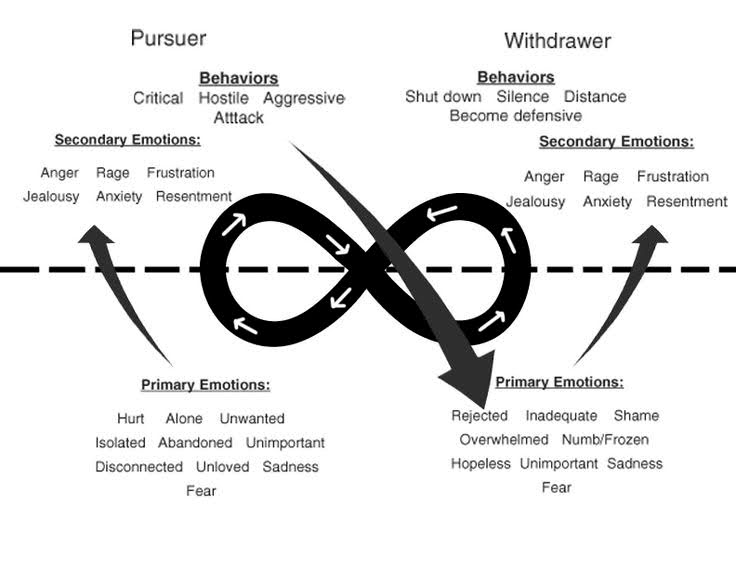The Couple Poka: Understanding the Demand-Withdraw Dance in Relationships

Relationships are one of the most meaningful parts of our lives—and also one of the most complex. As couples therapists, we often see a familiar pattern emerge between partners under stress: one person reaches out, while the other pulls away. This cycle is what Emotionally Focused Therapy (EFT) calls the “pursue-withdraw” dynamic—sometimes nicknamed the “couple poka,” like a dance with two steps that partners repeat over and over again, even when it leads to disconnection.
What is the Pursue-Withdraw Pattern?
This dynamic typically shows up in moments of emotional tension or conflict. One partner (the pursuer) tends to raise concerns, ask questions, or seek connection, while the other partner (the withdrawer) may shut down, become quiet, or avoid the conversation.
From the outside, it might look like:
- One partner says, “Why won’t you talk to me? I need to know what you’re feeling,” while the other responds with silence or walks away.
- A conflict escalates because one partner keeps pushing for answers while the other retreats, feeling overwhelmed or attacked.
At its core, this cycle isn’t about one person being “too much” and the other being “too cold.” It’s about protest and protection—two different ways of responding to emotional vulnerability.
Why Do We Get Stuck in This Dance?
In EFT, we see this pattern as a natural but painful response to feeling disconnected or unsafe in a relationship. The pursuer is often driven by fear of losing connection and seeks reassurance or closeness. The withdrawer, on the other hand, may feel criticized or like they can’t get it right, so they protect themselves by pulling away.
Both partners are trying to cope—but in ways that leave them feeling even more alone.
This dance can become an emotional loop where each person’s moves trigger the other’s: the more one pushes, the more the other retreats, and vice versa. Over time, this can erode emotional safety and make it hard to feel truly heard, seen, or loved.
How Can Couples Break the Cycle?
It’s possible to step out of this painful dance. Here are a few strategies:
- Name the Pattern Together – Instead of blaming each other, name the dance. Try saying, “It feels like we’re in that loop again where I chase and you pull away.” Naming the pattern helps make it the problem, not each other.
- Recognize the Emotions Beneath the Moves – Ask yourself: What am I really feeling underneath this reaction? Am I afraid of being abandoned? Am I feeling like a failure in this moment? Learning to identify the vulnerable feelings beneath your behavior is key to changing the pattern.
- Create Safe Conversations – Slow down and invite gentler communication. Use “I” statements instead of “you” accusations. For example: Instead of “You never talk to me,” try “I feel alone and I miss being close to you.”
- Practice Soothing – Together and Apart – When tensions are high, take breaks that help you self-soothe—but also come back to reconnect. Try breathing exercises, journaling, or even a short walk before returning to the conversation.
- Reach for Help When You’re Stuck – Sometimes the pattern is so ingrained that it’s hard to shift without support. That’s where couples therapy can help. In EFT, we guide you to slow down, tune into the deeper emotional needs behind the dance, and begin to reconnect in a way that feels safe for both partners.
You’re Not Alone — We’re Here to Help
If you and your partner find yourselves caught in this dance, know that it doesn’t mean your relationship is broken. It just means you’re human—and your relationship may be ready for a new rhythm.
At North Bay Counselling, we’re here to support you. Our therapists are trained in Emotionally Focused Therapy and can help you move from disconnection to deeper understanding and intimacy.
Reach out today to book a session. Together, we can change the steps of the dance.














